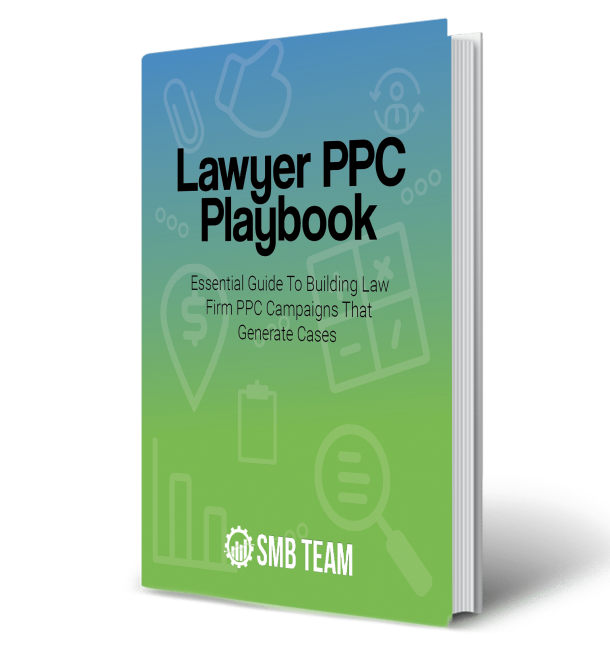There are endless ways for law firms to position and market themselves online. In today’s day and age, advertising is nearly everywhere you look.
It’s on the side of the bus while you’re driving to work, it’s plastered out front of what seems like every coffee shop and store that you walk into.
The second you open up on your phone in the morning, your screen is infiltrated with ads to the point that we have become almost numb to them.
Pay Per Click advertising (PPC) is one of the only forms of advertising that ensures your law firm is showing up when your prospective clients are searching.
In 2018, over 86% of all American consumers used search engines in order to find local businesses that matched their specific wants and needs.
As the popularity of mobile phones continues to rise, so does mobile search engine use. Over 53% of searches occurred on mobile devices as opposed to computers or laptops.
Of those searchers? Over 64.6% state that they click on Google ads when they’re shopping online.
With all the changes, updates and technological advances in the digital marketing industry one thing remains the same: the power of law firm PPC.
Law Firm PPC is the most dominant and fastest driver of intent-based leads.
But in 2019, your law firm’s PPC campaigns and ads need to be more nimble and mobile-friendly as ever. With the fast paced environment of the online world, you need to ensure that your quality scores stay high in order to ensure lower cost per clicks and ad positions.
Don’t worry, this definitive guide will help you set your first law firm PPC campaign up for success.
Getting Started with Law Firm PPC
Pay Per Click (PPC) advertising is the fastest way to generate immediate leads for your law firm.
While SEO and Social Media are great and necessary strategies for marketing your law firm, they aren’t the best avenues for generating immediate leads and cases.
You’re most likely reading this because you’re interested in how you can increase the amount of phone calls and client that you bring through your doors.
Law firm PPC is the only way to ensure that you’ll get the phones ringing and clients in the door immediately after setting your campaigns live.
It’s not some black magic technique or secret trick. The key to setting up your first successful law firm PPC campaign is to do it right.
After running law firm PPC campaigns for countless attorneys & firms, we’ve seen everything from terrible keyword choices, to the wrong settings being selected. At this point, we’ve almost seen it all.
This guide will serve as your beginner’s handbook to all things law firm PPC – an easy and digestible step-by-step framework to set up your campaigns.
Download our free Law Firm PPC E-Book and keep it handy saved on your desktop or phone as you’re taking your first steps with Pay Per Click advertising.
If you’re too busy running your law firm right now to read this entire guide, download the E-Book and read through it when it’s convenient for you!
Identifying Your Ideal Client
Any good law firm PPC campaign is rooted in data – understanding your ideal client and their behavior is vital to setting yourself up for success.
Essentially, you should understand what your customer’s want, when they’re searching and how they’re searching for it.
This should be fairly easy for you to think about – after all, you’re dealing with these clients every single day. Who comes into your office? How are they dressed, how do they speak, what are their concerns and frustrations? What do they fear?
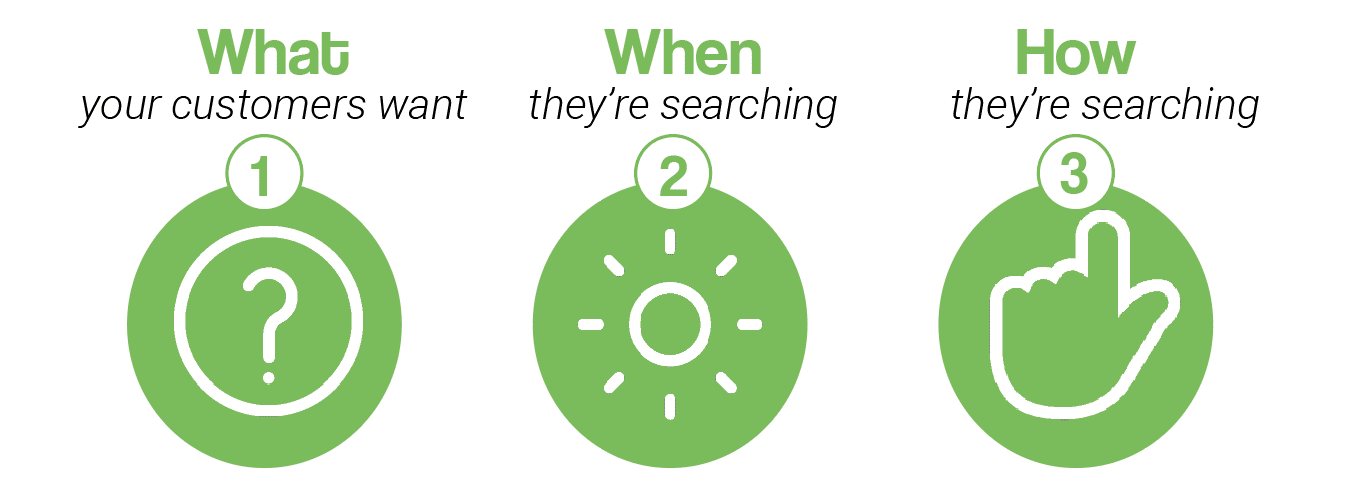
If you can answer those three questions quickly, you’re off to a great start! If not, you’ll have to conduct more research before launching your law firm PPC campaign. Otherwise you’ll be wasting ad spend on clicks and searches that will never result in real, paying clients.
Some things to take into account are: job title, marital status, household income, age, gender, etc.
If you’re a criminal defense firm you may understand that your ideal client is a hard working, blue-collar laborer with a family who may have just found him or herself in some unfortunate circumstances.
Or, let’s say that you’re a divorce lawyer and know that your clientele is mainly C-suite executives and high net worth individuals.
Knowing the WHO is vitally important to your law firm’s PPC campaigns.
Finding Keywords That Attract Leads
Chances are that if this is your first time running a law firm PPC campaign, you’re nervous about wasting money.
Perhaps you’ve heard horror stories form other attorneys where they turned on a Google Ads campaign and burned through thousands of dollars within a matter of weeks.
Don’t worry – we’ll share a simple and easy process to follow that ensures you’re slowly testing, gathering data, and driving results with your law firm PPC campaign.
The first step is to find cost-effective keywords within Google’s Keyword Planner.
As you can imagine, the linguistic nuances vary depending on geographic location in the United States. For example, more affluent demographics are more likely to search the word, “attorney” instead of “lawyer”.
Open up a separate document where you can make a list of your keywords – we’ll get to how you organize them later on.
NOTE: If you’re running a national law firm ppc campaign, you can leave the location as “United States”. If you’re looking to just advertising within a specific geographic area, filter by the city and state.
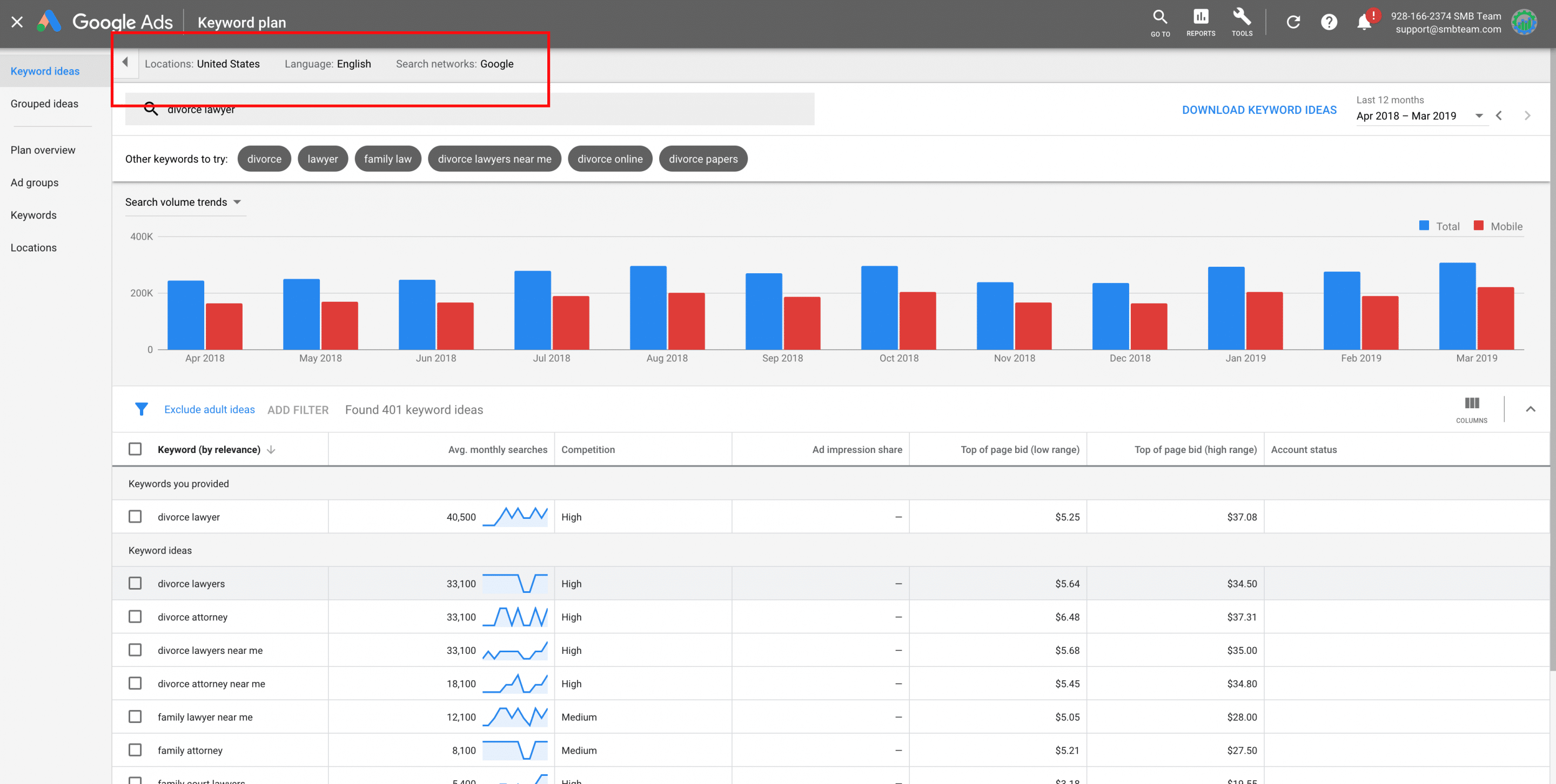
Type in general search keywords and phrases for the area of law that you’re looking to target.
You’ll want to get as specific as possible here to allow for the most keyword variations as possible.
Don’t just type in “divorce lawyer” – think about your ideal client and what THEY may be typing into Google when making an intent-based search.
Look for different variations such as, “divorce attorney”, “separation attorney”, “divorce lawyer near me”. Relevant keywords with a low Cost Per Click (CPC) should be treated like gold.
The column that matters most is the “Top of Page Bid (High Range)”. What can you expect to be paying if there are multiple people bidding on the same keywords during the same time of day.
A keyword may have a $5.05 low range bid, but a $90.45 high range bid.
If you’re not cognizant of this, you may run your budget dry fairly quickly.
Once you’ve gathered a list of 15-20 high traffic keywords per vertical, you can move onto actually building the campaign.
Understanding Keyword Match Types for Law Firm PPC Campaigns
Keyword Match Types are different variations that Google will use for the keywords that you tell them you want to show up for. You are basically telling Google what you want to show up for, and what you never want to show up for. Getting this right is the foundation for your law firm PPC campaign.
There are four different Keyword Match types that you can use in your law firm’s PPC campaign.
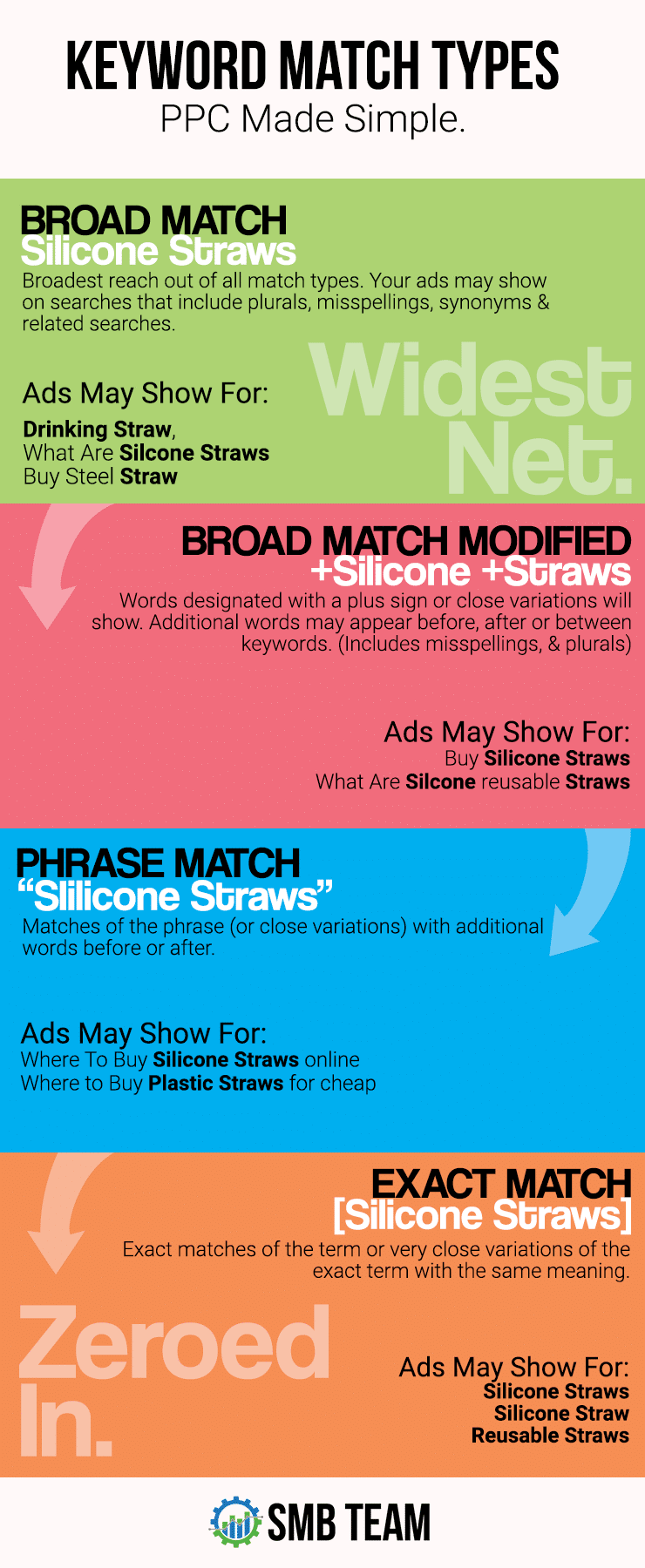
As you can see, there are quite a few different ways that Google can use the keywords that you put in for your law firm PPC campaigns.
But the question is, which ones do you want to use?
It all depends on what the goals of your law firm PPC campaign is. Let’s say that you’re going after an extremely clear niche like: paternity rights, and you’re uninterested in any work outside of this niche.
Well, you’ll most likely want to stay away from broad and broad modified keywords. These searches tend to pull in a lot of “junk” clicks and calls from searchers who don’t fit your criteria.
Exact Phrase and Phrase Match will be your best friends. These searches will be the highest quality and of highest value to you and your firm. You know that if someone specifically types in “Paternal Rights attorney near me”, chances are that this individual is going to be one that you can serve.
You want to show up any time someone specifically types in Paternal Rights – you know that these individuals are highly qualified and looking exactly for your services.
The Power of Negative Keywords in Law Firm PPC Campaigns
If you are reading this… then you better input negatives keywords into your law firm’s PPC campaigns. Seriously, we mean it.
The number one mistake that you can make in your lawyer PPC campaign is failing to utilize negative keywords. It’s one of the most fool-proof strategies to avoid wasting your Ad dollars.
Remember that fear that we we’re talking about earlier of burning out your PPC budget and not getting an ROI from your campaigns?
The fastest way to do that is by failing to use negative keywords. They’re that important.
So, what exactly is a negative keyword you ask? Well, we have an entire blog post dedicated to negatives, but to summarize:
Negative Keywords are any word that you do not want your law firm to show up for.
For example, if you’re a Family Law attorney in Chicago, and you only want to show up for cases within the city’s limits – you’d exclude every surrounding town and county.
Failing to do so will result in unwanted cases, clicks and clients whom you wouldn’t be able to serve because they’re outside of your geographic area.
If you’re a criminal defense attorney but strictly stay away from DUI cases, you would want to use negative keywords for: DUI, DWI, OVI, etc.
Doing so will prevent your ads from showing to users who are specifically looking for a DUI case. We understand that these criminal defense cases are relatively hard to win.
So, stick to what you know and go after the cases that you know can produce profitable outcomes with your law firm PPC campaigns.
Organizing Your Keywords
Once you have mapped out the keywords that you want to target and exclude, it’s important to get them organized. We recommend building this in a Microsoft Excel or Google Sheet document so that you can keep your campaigns organized.

The more specific your ad groups are, the easier it becomes to track and measure how they’re performing.
One thing to keep in mind is that very specific, long-tail keywords give HUGE insight into search-intent and the quality of the lead.
What does this mean?
If someone were to type in, “Best Paternal divorce lawyer in Miami” – you know that this candidate has most likely done some research. They know that there are lawyers out there who specifically help fathers and dads in divorces. You also know that they’re specifically looking for the best lawyer in Miami.
This lead is (most likely) willing to pay higher retainer fees to acquire top-rated service from a lawyer with a proven track record.
Build A High Converting Law Firm PPC Campaign
Now we’re at the stage where we can begin building the actual PPC campaign.
But before we get into the nitty-gritty details, here is a brief overview of how a campaign is structured.

Campaigns reside over everything – this is where you set the type and goal.
Keywords are the foundation of every campaign. They tell Google what to show your ads for, and what not to.
Ad Set’s are the physical ad – this is where you input the copy and add extensions to increase your conversion rate.
You’ll want to login to your Google Ads account and create a new campaign.
1. Select “SEARCH” Campaign Type
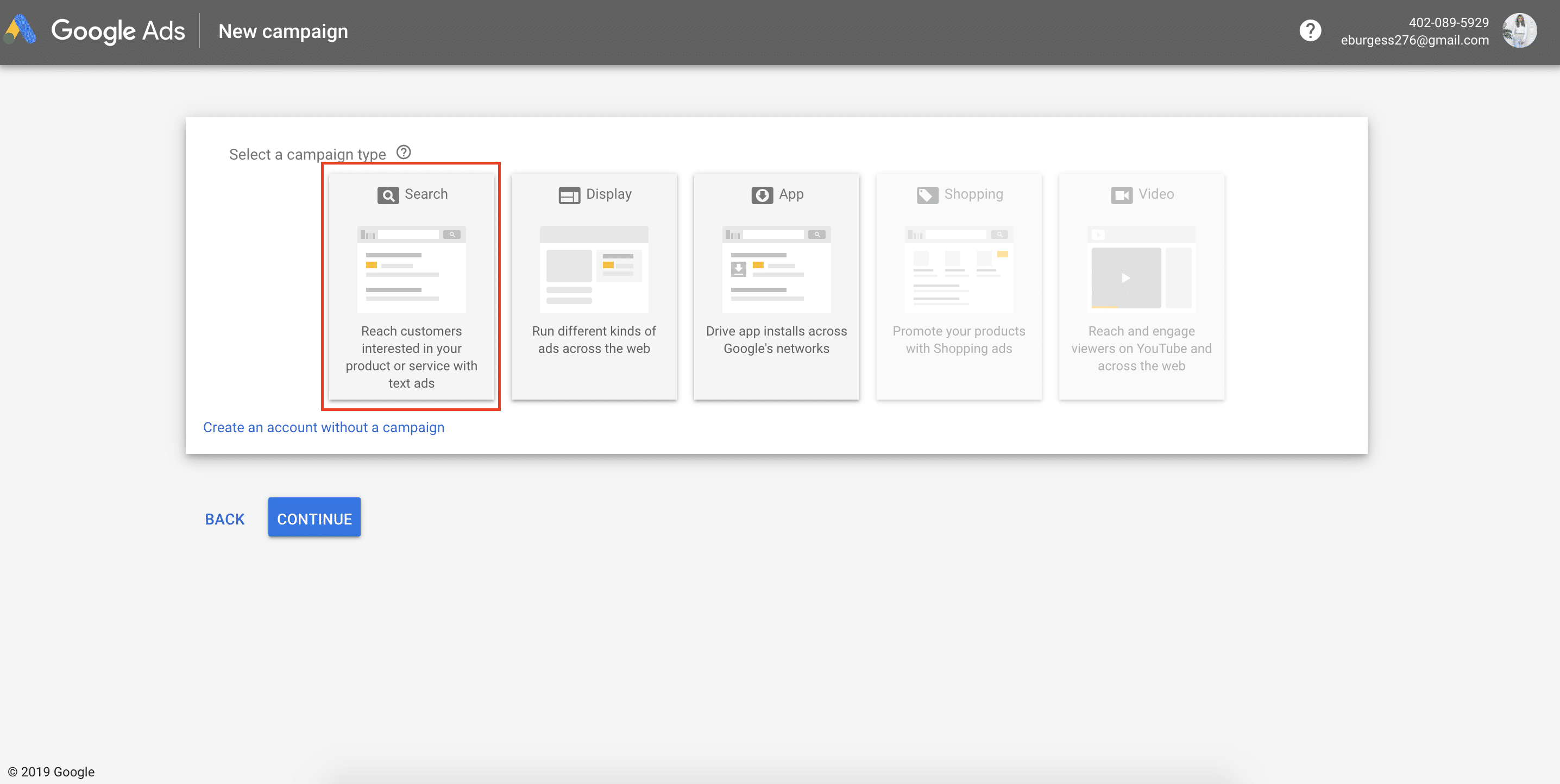
Unless you’re running a display ad, you’ll want to select “Search” campaign type. This means that your ads will show on Google.com when potential leads are searching.
Campaign types determine where customers see your ads and the settings and options available within those ads.
But, for your basic PPC campaign, you’ll use the search campaign.
2. Select Campaign Goal
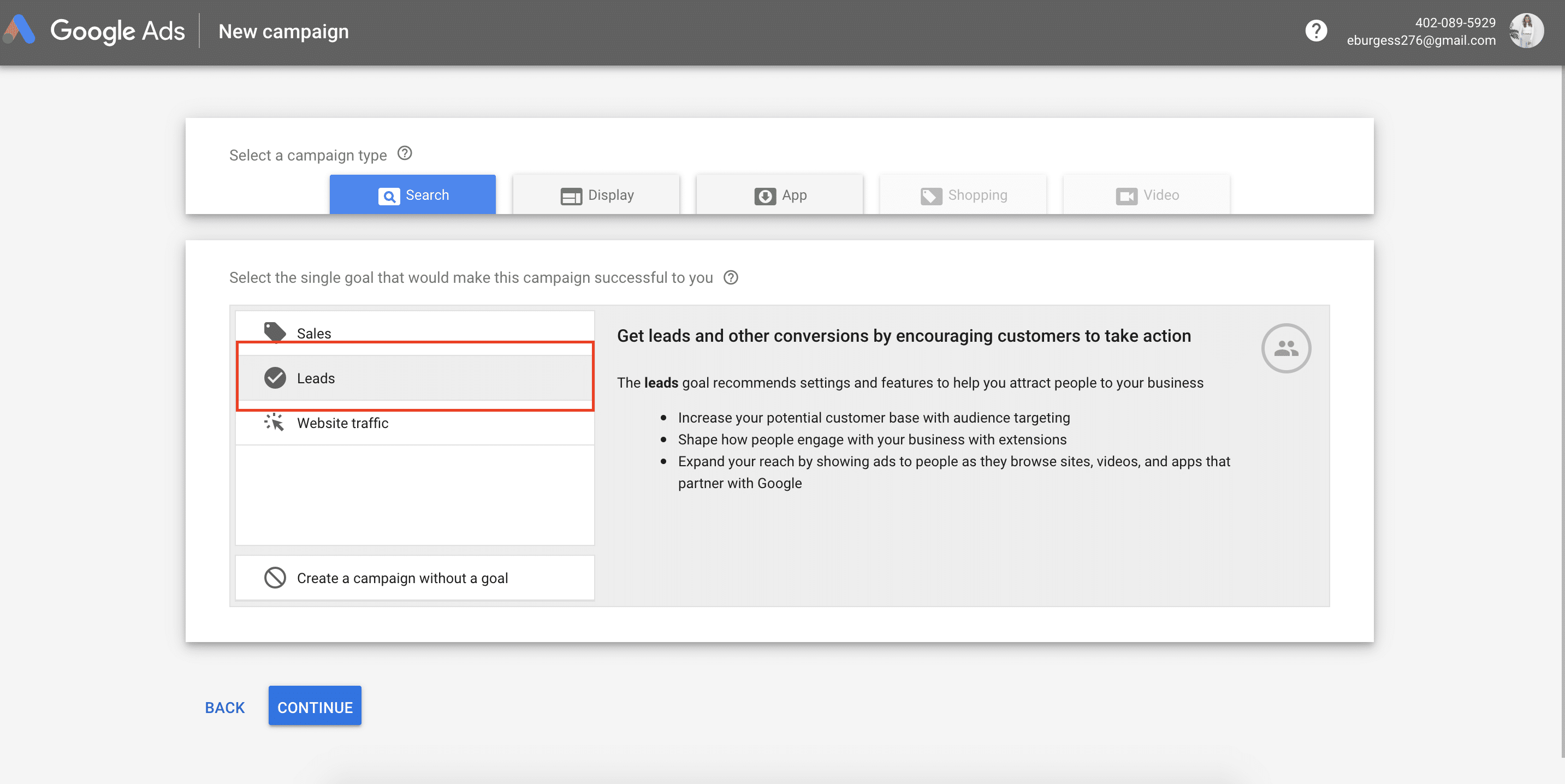
For this example, we recommend using the Leads goal for your campaign.
Essentially what this means is that you’ll be able to include specific features that’ll increase the potential that a searcher becomes a lead for your business.
With campaigns that have leads as the goal – specific features that start the conversion process will be available to you such as: audience targeting, extensions and access to Google’s partner network that will increase the likelihood of your ads being seen by the right audience.
3. Select how you’d like to reach your goal
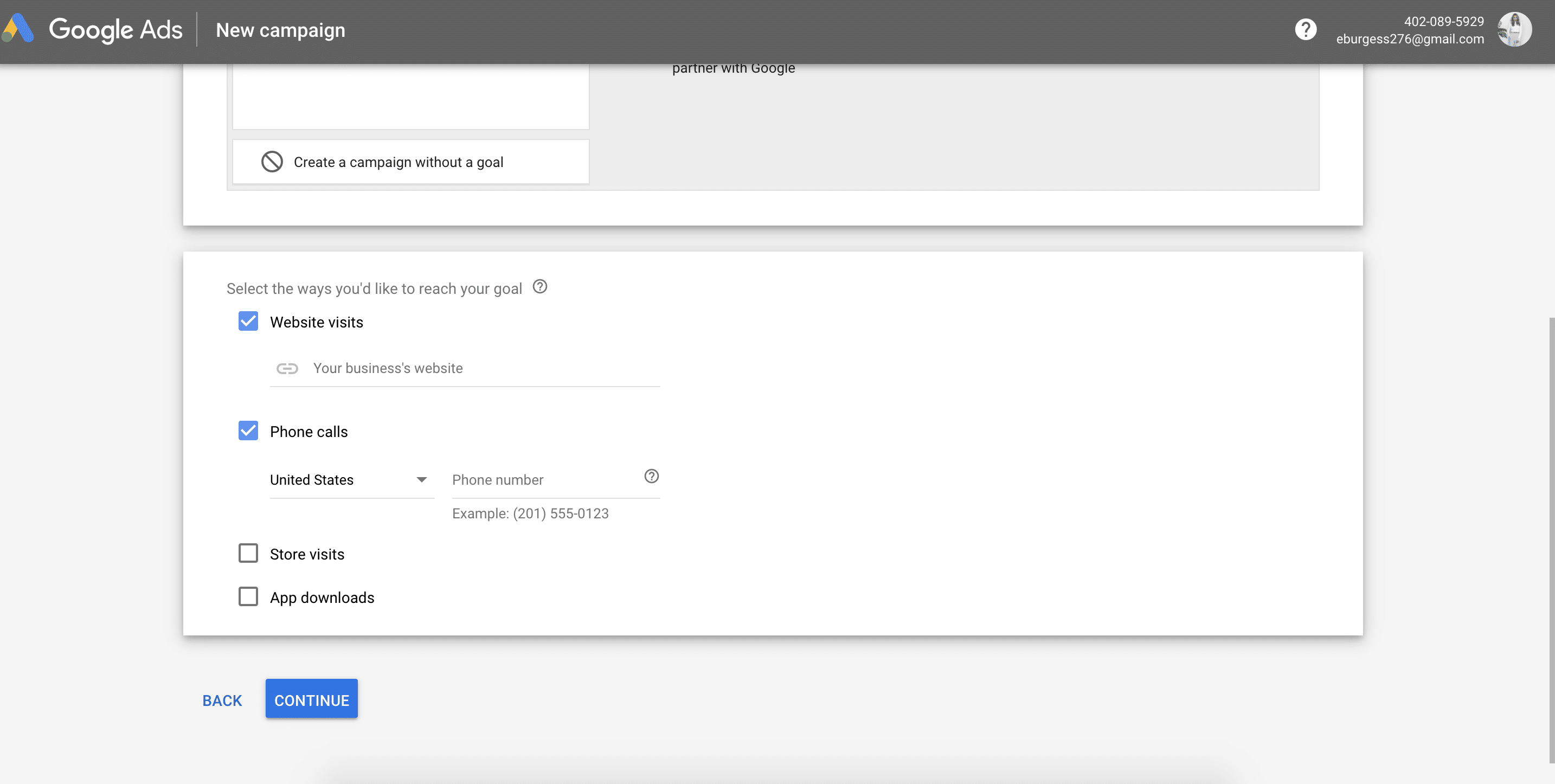
There are four different options here: website visits, phone calls, store visits and app downloads.
As a law firm, the only two options that you want to select are website visits and phone calls
4. Update Campaign Settings
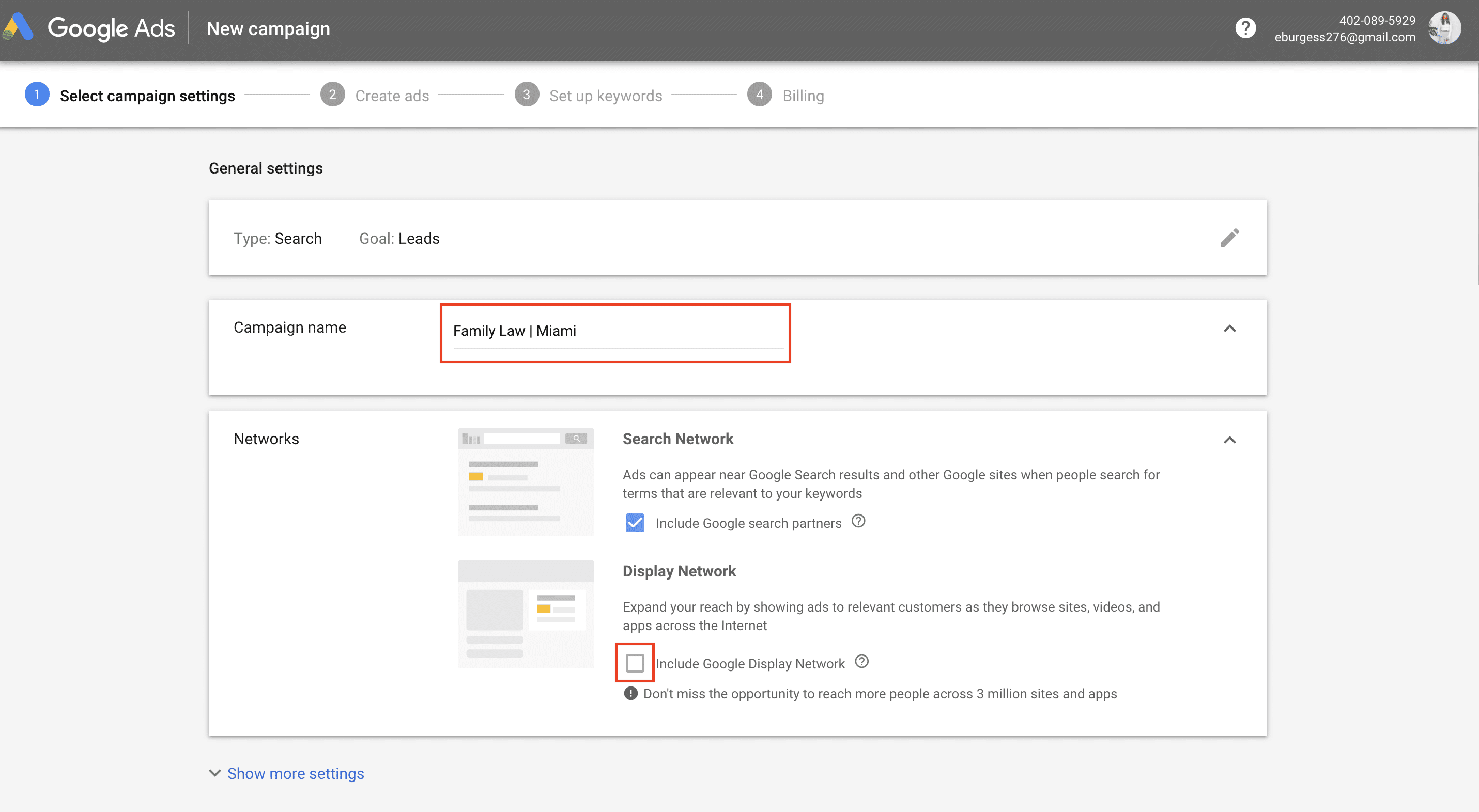
This is pretty straightforward, but you’ll want to rename your campaign.
Use a naming system that works for you. Ideally, it should describe the niche of law and location.
Having a general system for naming your campaigns will come in handy in the long-run when you have multiple campaigns running at once.
Additionally, you want to unselect display network, making sure that only the Search Network is running. Otherwise, your ads will start to show across Google’s Display Network of over 2 million websites, videos & apps.
While this is a great option with some campaigns, it may burn through your budget on users who aren’t specifically looking for your services.
5. Determine Location Targeting
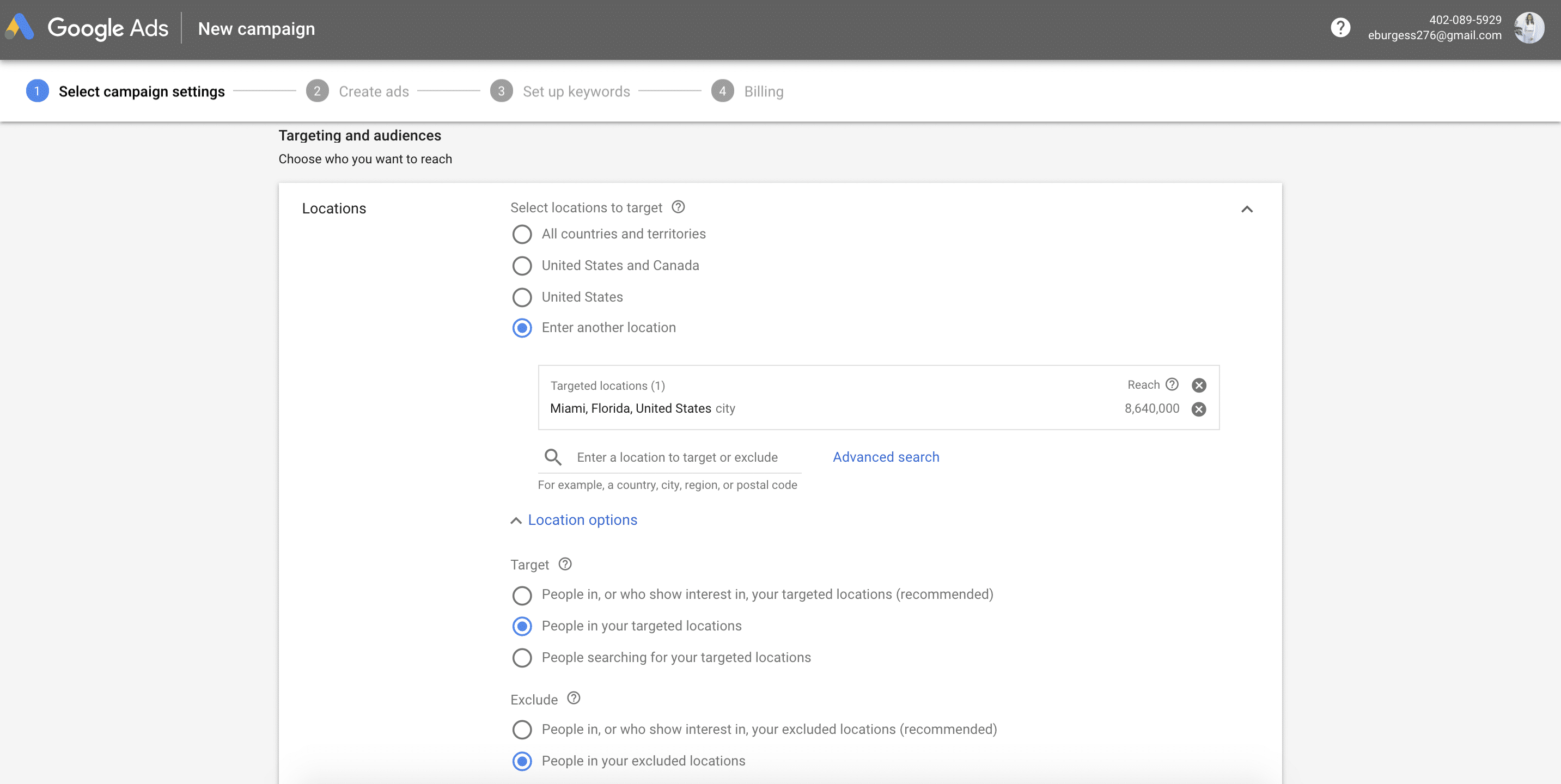
This is where you need to really pay attention!
Ensure that you include (and exclude) each specific area that you want to target.
For example, are you only concerned with serving clients within one specific city such as Miami, Florida. But, you’d never want your ad to show up for a search in Fort Lauderdale, Florida?
This is where you’d tell Google that very information.
6. Deciding On A Budget
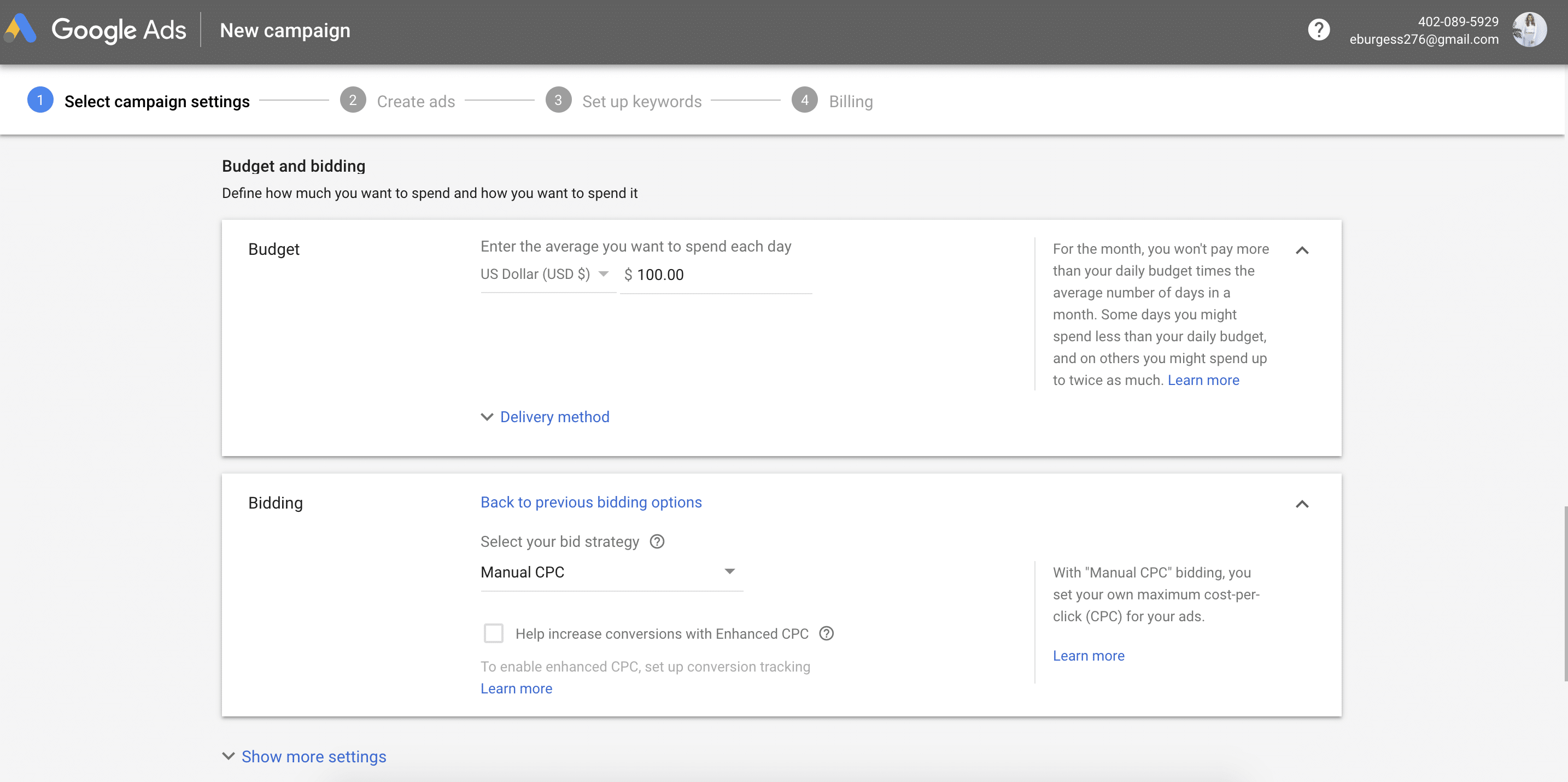
Your daily budget is 100% in your control.
Depending on your specific geographic location, you’ll want to have a competitive budget.
For example, in highly populated metropolitan areas such as New York City or Los Angeles, you’ll want to ensure that your ads have a high enough daily budget that you show up for searches.
If not, you’ll get eaten alive by your competition.
We recommend starting with a daily budget at anywhere from $50-$100 dollars per day. Don’t worry, Google won’t ever go over this number.
However, there will be circumstances when Google doesn’t even come close to spending your daily budget. This may be an issue within itself as the keywords that you’re bidding on aren’t getting enough search traffic.
One way to understand how much to set your daily budget at is to do a little bit of competitive research.
Spying On Your Competitor’s Law Firm PPC Ads
If you aren’t aware of who your major competitors online are – There are two things that you can do. The first being a simple Google search to see what lawyers in your area are bidding on, how they’re showing up and what their ads look like.
Given that you’re physically located and searching in the area in which you’d be targeting, simply go to Google and type in a search related to your field of law.
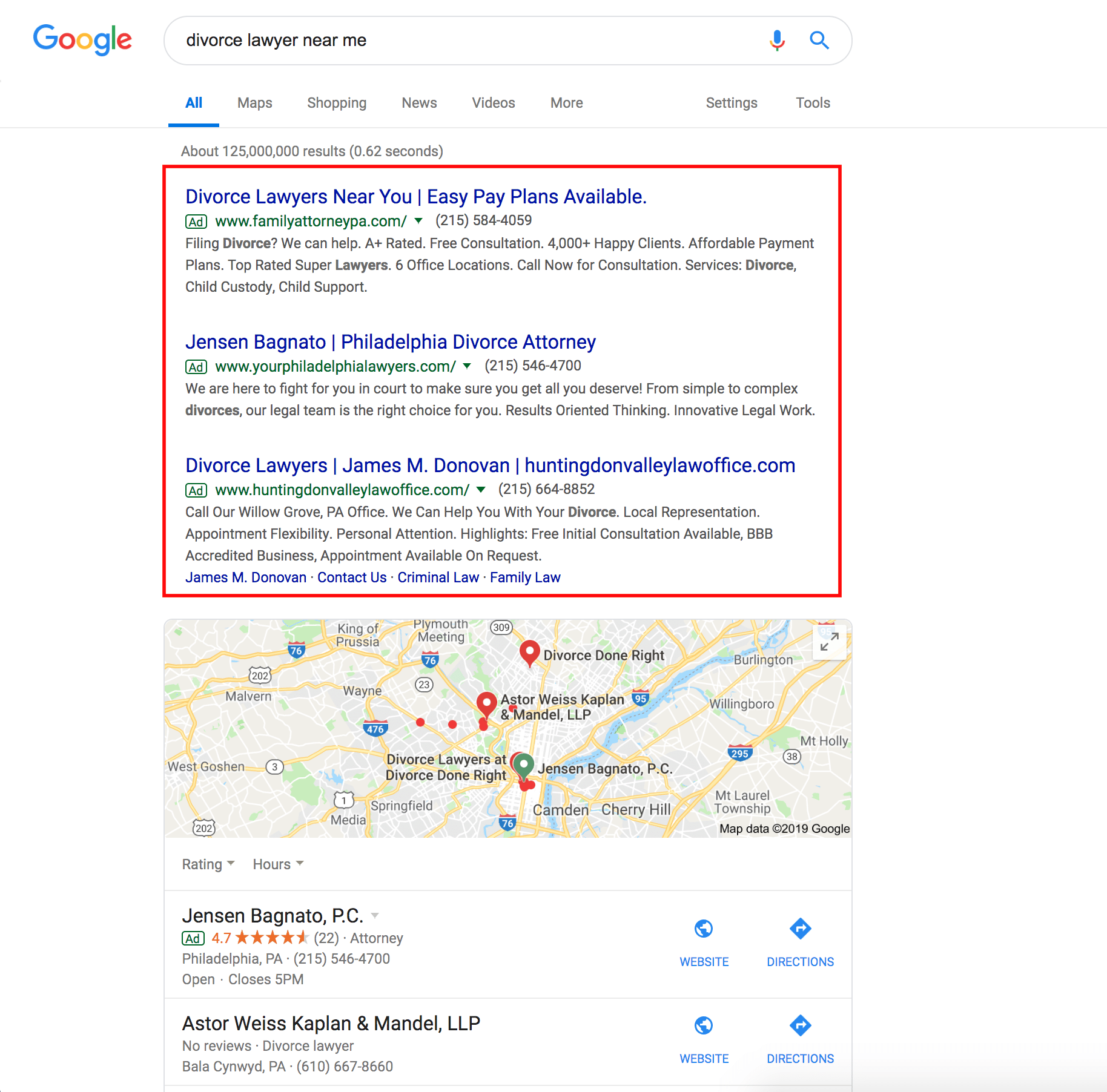
For the sake of this example (seen below), I took the third ad down and copy and pasted it into SpyFu.
From there, SpyFu scans their URL to see which keywords on Google are linked to it and pulls the data that it has.
If you click “Paid Search (PPC) on the right hand side, you’ll be able to bring up a deeper analysis into their Paid Advertising campaigns.
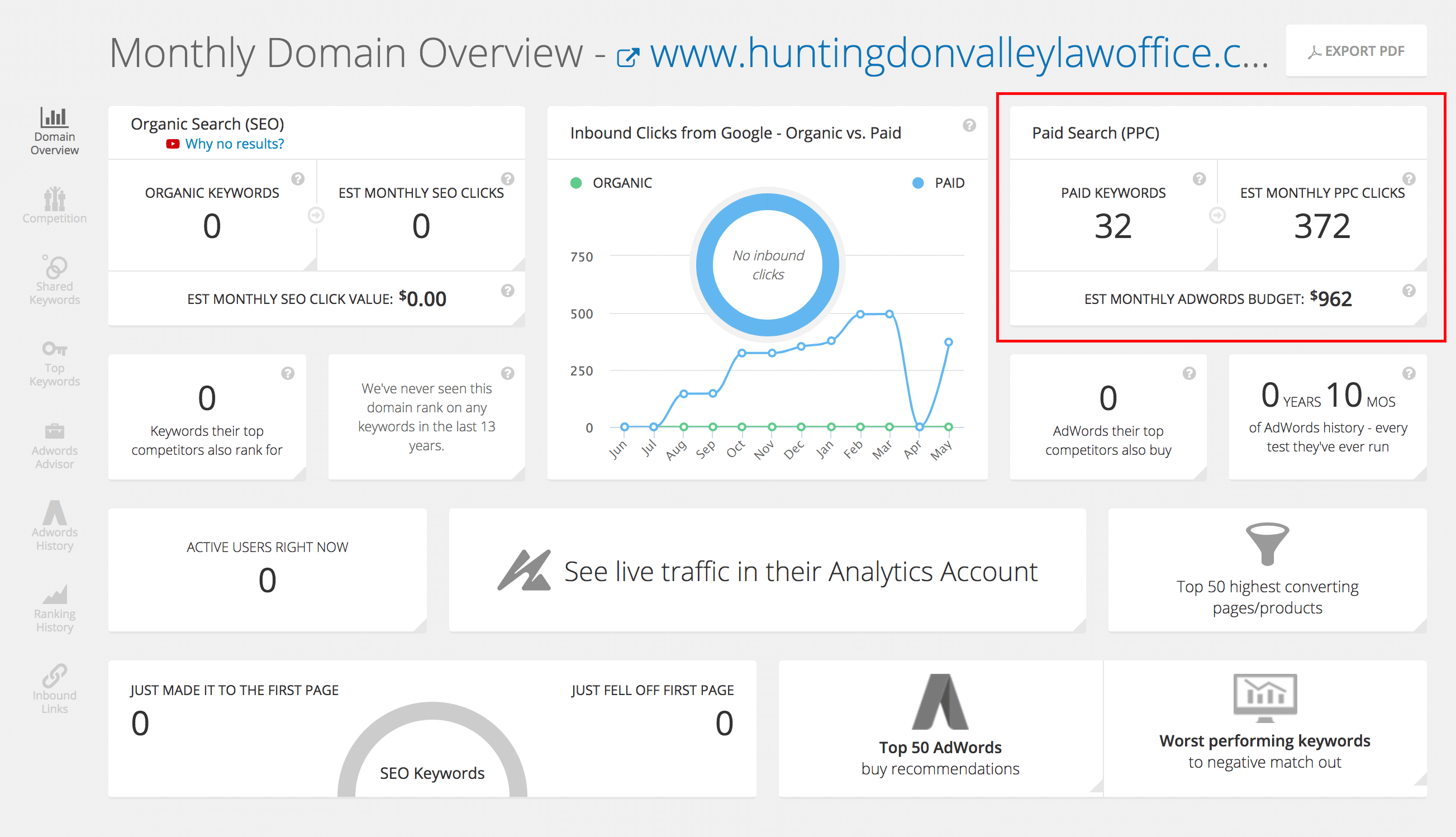
Once you pull up the in-depth PPC report (seen below) , you’re able to see what specific keywords they’re bidding on and a rough estimate of their CPC as well as their monthly budget.
While there’s no way for SpyFu to 100% accurately tell, it uses a fairly accurate alogirthm to determine these numbers.
Continue this process for 3 or more competitors to get a good idea as to what they’re spending online.
You’ll be able to use this as a gauge for what you set your daily budgets at, which keywords you want to bid on and which you’d like to stay away from.
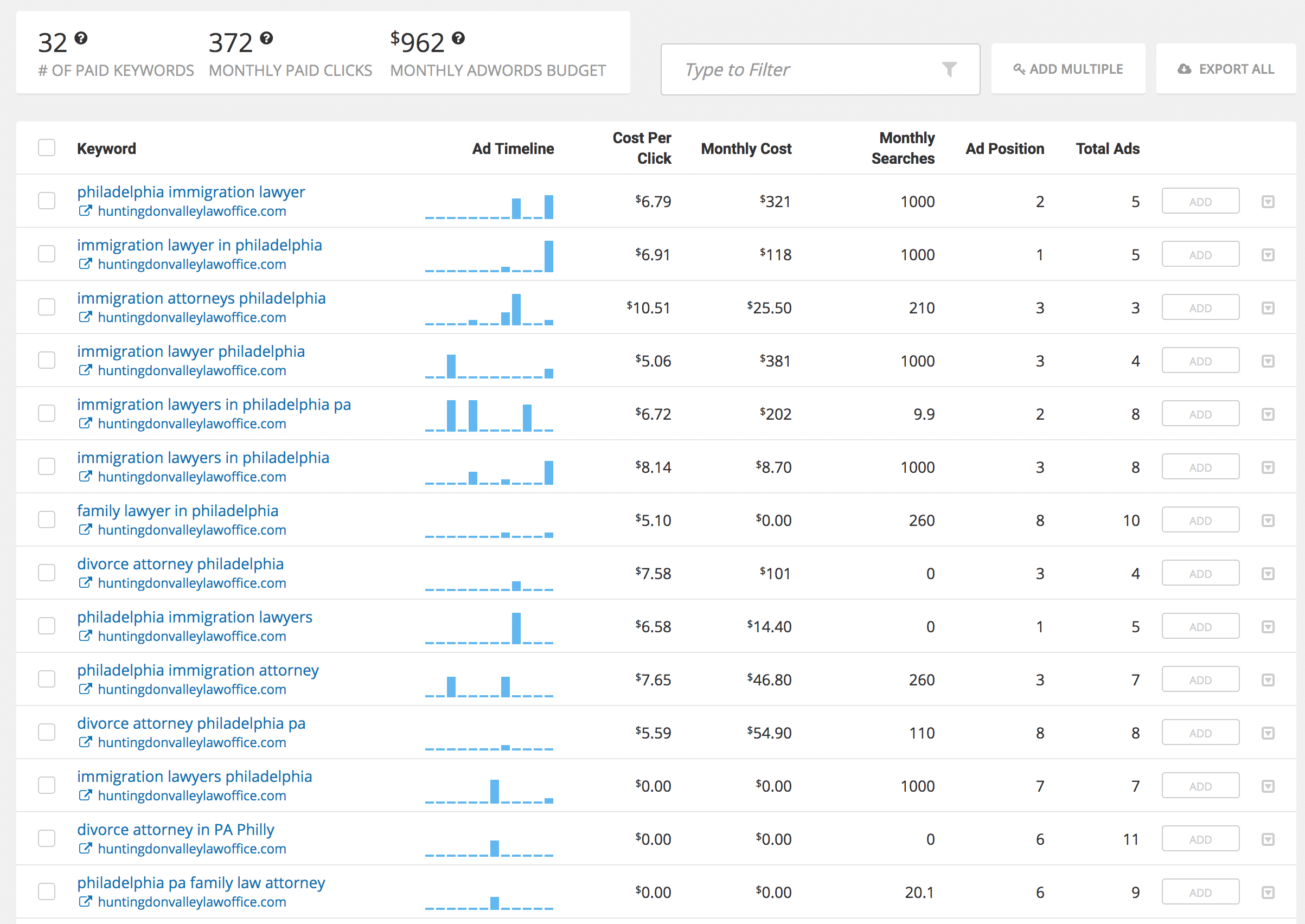
Writing Law Firm PPC Ads That Sell
Having persuasive, effective and clear copy writing skills are necessary for creating Google Ads that convert into paying legal clients.
You want to be able to clearly position your company amongst the competition while also speaking directly to your ideal clients’ needs. This makes all world of difference when it comes to generating a positive ROI from your law firm PPC campaigns.
The key here is to have your campaigns so highly targeted that the ads feel as though you’re speaking directly to the user on the other side of the search engine.
In a study conducted by One Spot, over 87% of consumers stated that personally relevent branded content positively influences how they feel about a specific brand or agency.
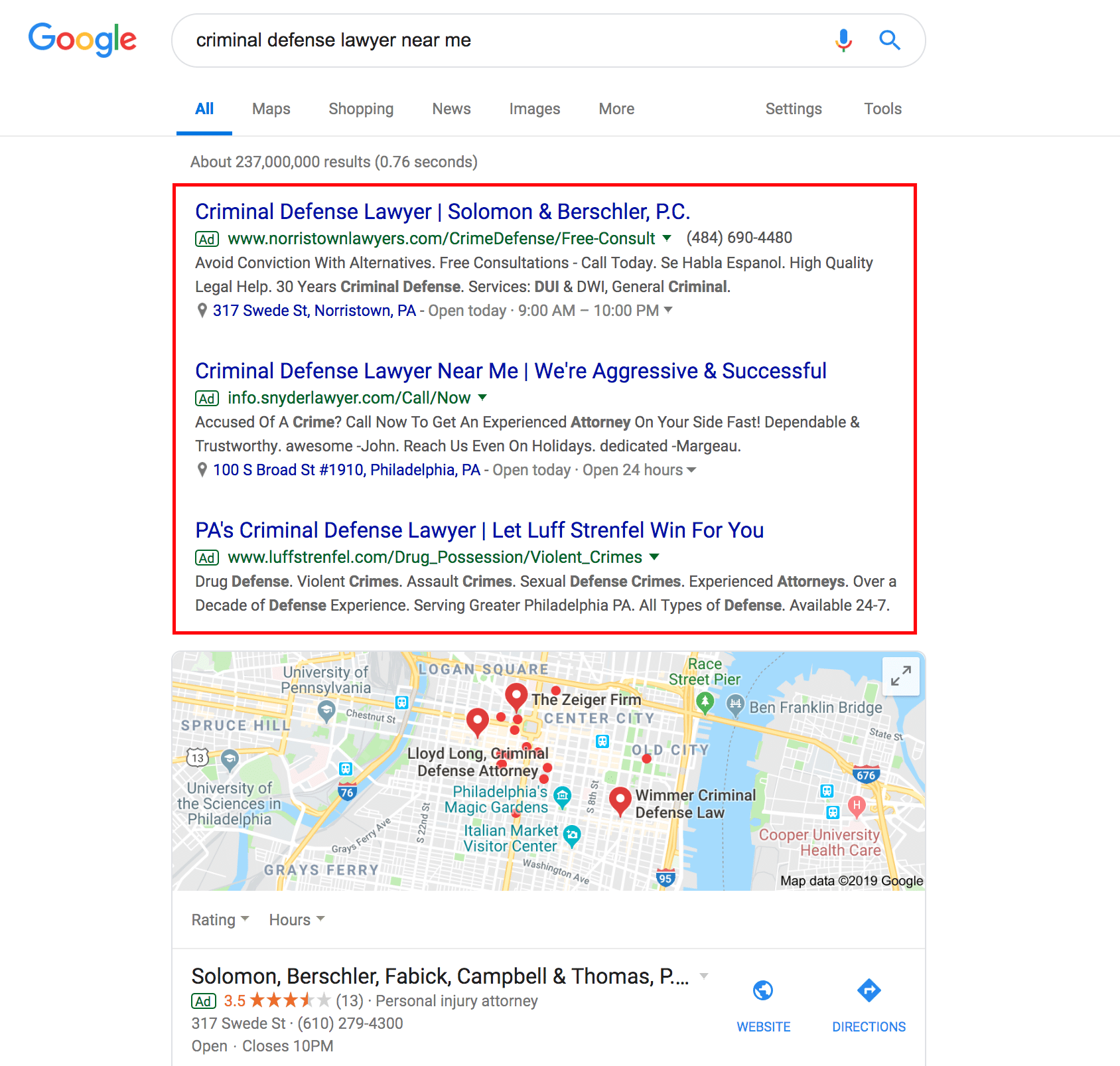
Which ad from above do you think speaks directly to the consumer? Take in all accounts of the Ad: headlines, descriptions and extensions
In our opinion, #2 speaks the most clearly to a potential client. Here’s Why:
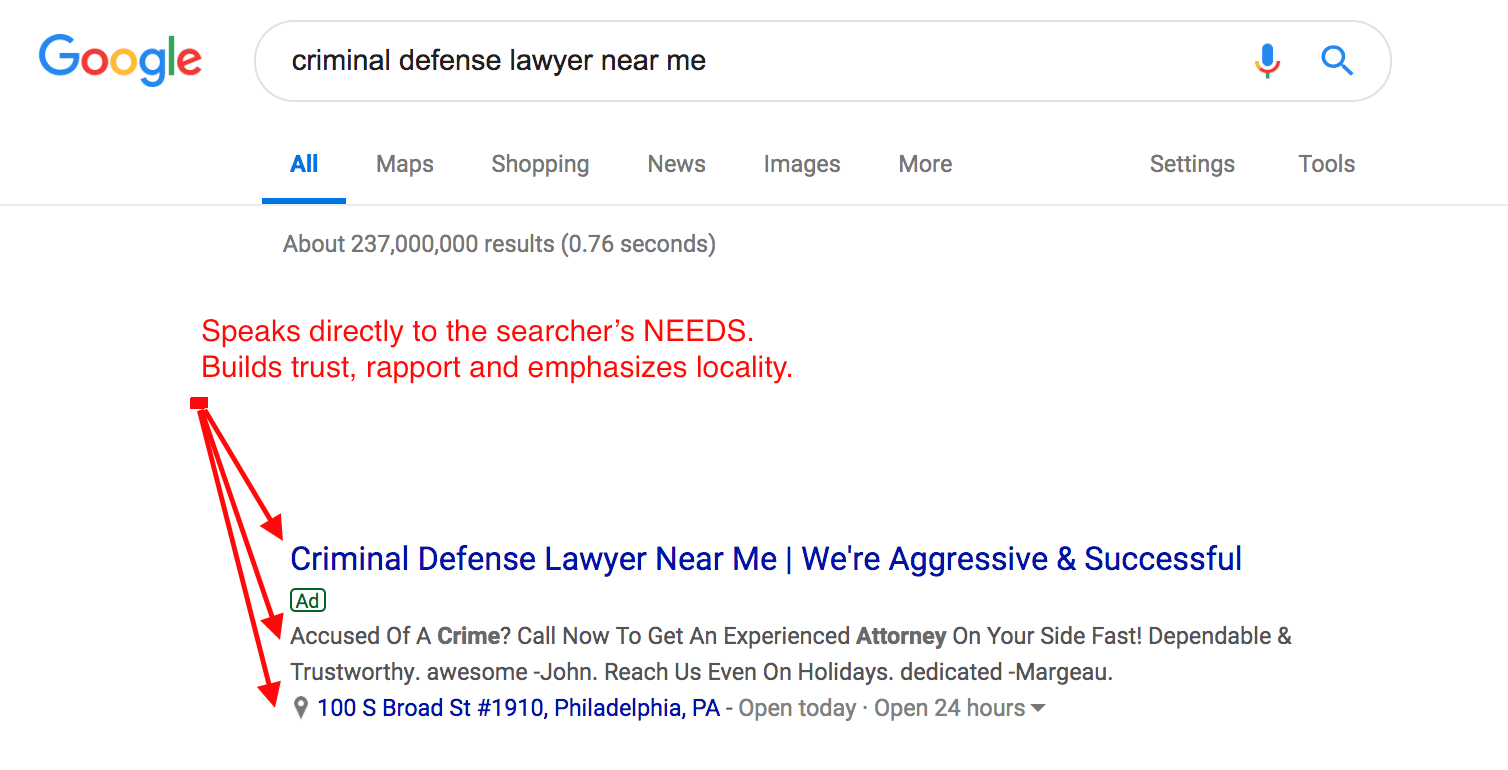
Speaks Directly To Searcher – It answers their needs specifically in the description. “Accused Of A Crime?”. If someone is looking for a criminal defense attorney, chances are that they or a loved one have found themselves in some form of criminal trouble.
Builds Trust & Rapport – “We’re Aggressive & Successful”. When dealing with a criminal charge, these types of cases can be as small as misdemeanors to as large as federal charges. Potential clients want to know that you’re going to fight for their rights and have a proven track record.
Emphasizes Locality – When an individual types in “Near Me”, you already know that they’re fairly serious about needing legal representation. They aren’t searching “criminal defense lawyer” to do research, they’re looking for one to contact. By including “Near Me” in the headline as well as the location extension it emphasizes the fact that this specific law firm is local to the searcher.
Secret Power of Ad Extensions for Conversion Rate
Extensions are add ons to the bottom of a Google Ad that help increase the conversion rate.
Conversion rate is arguably the most important metric to use when evaluating how well your PPC campaign is performing.
Ultimately, conversion rate tells you how many people that see your ad are taking a desired action. This desired action could be a phone call, form fill or a click on a specific part of your landing page.
Ad Extensions go below the description and they allow you to expand your ads so that they take up more space above the fold as well as provide clickable links that increase your click through rate (CTR).
There are many different types of Ad Extensions that you can choose, but a general rule of thumb is to select extensions based on your goal.
How do you know which ones to choose? We’ve outlined that below.

Goal: Purchase From Business Location
Location Extensions – These encourage individuals to visit your business by showing your address, a call button and links to your business details page which gives them hours of operation, photos of your business and directions on how to get there.
Callout Extensions – These include any specific services that your business provides such as, “Free Delivery” or “24 Hour Service”. These types of conversions help convert searchers offline.
Goal: Contact You
Call Extensions – Adding your phone number or a call button to your ads increases the likelihood that a searcher takes an action and calls your business to speak directly with you and learn more.
Message Extensions – These allow users to send you text message directly from your ad.
Goal: Website Conversions
Sitelink Extensions – These link searchers directly to specific pages on your website such as an “Order Now” page or your hours of operation.
Callout Extensions – These include any specific services that your business provides such as, “Free Delivery” or “24 Hour Service”. These types of conversions help convert searchers offline.
Structured Snippet Extensions – This type of extension allows you to showcase information that potential customers will find most valuable by selecting a predefined header and adding list items.
Price Extensions – These showcase your services or product categories with prices so that searchers can easily scan and browse your products right from your ad.
Putting It All Together
Once your Law Firm PPC campaigns are built and have gone live, you’ll have to monitor them daily so that you can make optimizations that may save you time and money in the long run.
Give your campaign 3-4 weeks to gain traction and real data – from there, you’ll be able to adjust keyword bidding, add or remove keywords, and find different ways to test ad copy. You’ll want to discard of any poorly performing ads that are wasting your budget and hurting your quality score.
Follow this guide when you’re setting up your campaign to improve your chances of seeing an ROI from your law firm PPC campaigns.
Have you ran your Law Firm PPC campaign yet? Share your experience and tips with us in the comments!
PPC Questions & Answers!
What Happens During The First 90-Days Of a New Law Firm PPC Campaign?
Unfortunately, there is a long learning period with any brand new Law Firm PPC campaign. This learning period is vital to the long-term success of your law firms’ PPC results.
During the first few days after a brand new legal PPC campaign goes live, there is a lot going on behind the scenes (most of which you are probably unaware of).
For example, a high-level legal marketing agency will be doing keyword-level bid management daily for the first few weeks to ensure your newly created ads are showing up within the top 2 positions on mobile and on desktop.
Each keyword will vary in competition (based on your target market) which further compounds the importance of this step. If one of your highest performing keywords is triggering an ad that is showing up on the 2nd page, this needs to be fixed.
Then, for the first 2 weeks, a good legal marketing agency will be doing HEAVY negative keyword optimization.
This involves looking through every single search term that people typed in before clicking on your ads, and excluding certain words to ensure that no money is being wasted on irrelevant clicks in your local market.
In addition, additional keywords will be added to your campaigns, all disapproved ads will be troubleshooted and mobile device optimization will begin to take place.
After month 1, it usually makes sense to start taking action on your split tests from a click-through-rate perspective. This is where we essentially will be doubling-down on the ads that are resonating the best with your local audience.
After month 2 or 3 (depending on the number of leads you’re getting per-week), you can start to do conversion rate optimization.
This involves pausing keywords that are not pulling in leads. It is vital to make sure you are making conversion optimization decisions based on a large enough sample size.
So, in some cases, it is better to wait until you have 90 days of complete conversion data to make decisions on.
Once you have enough data to make conversion optimizations, you can then begin to make demographic bid adjustments, to show your ads to people who fit your ideal demographic filters.
After 90 days, your remarketing list will grow to a point where your Facebook, Instagram and YouTube remarketing ads will begin to actually pull in some very inexpensive leads.
These leads will typically be people that visited your landing pages, but weren’t ready to call in when they first saw your ad.
The thing that makes me hurt inside is when a law firm tells me all of this work was put in, yet they still cancelled immediately after this 90-day window.
Asking For Help… A Letter From Our CEO

Building a profitable Law Firm PPC campaign that actually generates paying clients is hard work. Especially in the legal industry.
Not only is it competitive and saturated, but it can also be expensive. A novice Law Firm PPC campaign builder may inadvertently waste hundreds and even thousands of dollars. Not to mention the time it takes to build the campaigns and sharpen your skills.
If you’re reading this E-Book because you’ve either never built a Law Firm PPC campaign or you’ve built one that didn’t work, you may be thinking, “Hmm… I’m not sure how I’m going to do this.”
Let my team of expert Digital Strategists and Google Ads experts help you build profitable Pay Per Click campaigns so that you can get back to what you do best – serving your clients (not building marketing campaigns).
Download Our Law Firm PPC E-Book
Looking for more Law Firm PPC knowledge? Download our Free E-Book today and take it with you on-the-go.
